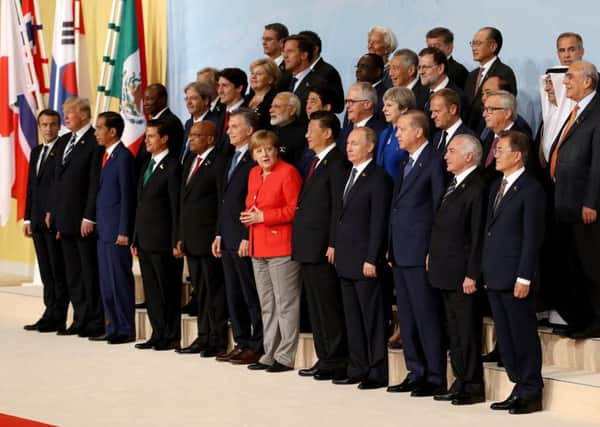Remi Edwards and Joe Richardson: G20's agenda is more selective than it appears


Necessarily, this has come to shape the US’s political right in a significant way, as is shown in the passionate critiques of so-called ‘big government’ by both the Republican Party and its supporters.
However, as evidenced at the Hamburg G20 Summit a week ago, this notion has less influence at the international level. Here, the prevailing argument is that in a globalised world, more issues can be solved through methods of global governance and less by individual nation states.
Advertisement
Hide AdAdvertisement
Hide AdIndeed, this appeared to be the mantra underpinning the G20’s pre-summit Priorities Report and post-summit Leaders’ Declaration, where the G20 claimed it would ‘assume responsibility’ on matters relating to health, economics, migration, the environment and many other issues.
In this context, the international community appears to be trying to tighten its grip on the issues it considers to be part of its own mandate, despite how contestable that mandate may be.
Nevertheless, there appears to be a disparity between the Group’s ambitions to govern international society and its confidence in performing this task effectively. For example, throughout the Declaration, the G20 countries frequently articulate their ‘commitment to’ and ‘monitoring of’ various internationalised issues.
These highly agreeable soundbites offer few concrete solutions to the above issues, depriving observers of a yardstick with which to measure the G20’s performance.
Advertisement
Hide AdAdvertisement
Hide AdFurthermore, there may be a method to the G20’s madness in relation to its selection of an all-encompassing agenda. One advantage for the Group is that it gives the impression that it is playing a pivotal role in each of these areas. However, when inspected more closely, the lack of specifics in certain areas shows that the G20 is more selective than it would care to believe.
This is the case for the issue of food security and agriculture. G20 members claim to want secure, accessible and affordable nutritious food for all, while reducing the water usage of the agricultural industry in order to enhance sustainability. What is not addressed is the huge contribution some sectors of the agricultural industry makes to human-driven carbon emissions.
Combatting climate change is a supposed central focus of the G20 countries, now evident in their commitment to the Paris Climate Change Agreement (with the exception of the United States). However, there has been little or no discussion of the curbing of agricultural sectors that produce high levels of CO2, undermining the G20’s commitment to a greener world.
Human rights is another extremely important issue that is mentioned little, apart from in relation to trade and labour, and once with regard to migration. Once again, this may be linked to the fact some members have a poor track record with regard to human rights protection, notably Turkey and China.
Advertisement
Hide AdAdvertisement
Hide AdThe G20 claims to want to improve international prosperity and well-being through addressing economic issues. Therefore, it seems strange that human rights, some of which are best protected through economic means, remain largely undiscussed.
The selectivity of the agenda also leaves out much structural reform of the economy with regard to reducing poverty and inequality.
Then again, the G20’s former attempts at redressing these imbalances have tended to be both divisive and unsuccessful, as shown in the split over the Doha Round of trade talks.
The completion of the round was pitched as one of Group’s primary objectives at the G20’s first ever summit in Washington in 2008.
Advertisement
Hide AdAdvertisement
Hide AdHowever, as a result of the developing world’s insistence that Western countries should drop their agricultural tariffs (which would have helped to make trade more equitable), countries such as the UK and the US came to favour the round’s termination. Concurrently, Brazil and India were pressing for its completion whilst simultaneously criticising the West for its alleged attempts at sabotaging WTO discussions.
In summary, it is easy to see why the G20 countries may be less inclined to implement policies radically different from those already in place, as they comprise 20 of the largest world economies and account for around 85 per cent of world GDP.
Their broad, yet covertly selective agenda ensures that solutions which may harm certain administrations do not feature in the G20’s discussions. As a result, the Group’s contribution to world politics may ultimately come down to preserving a system which protects its own interests.